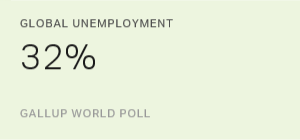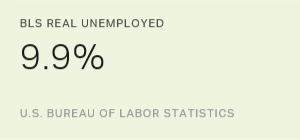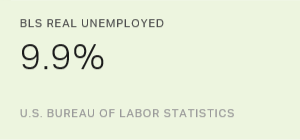This blog post is part of an ongoing series that originated with the post Killing Small Business.
What the whole world wants is a good job. This is one of the most important discoveries Gallup has ever made.
Our World Poll across 160 countries found out that over the past 100 years the great global dream has changed from wanting peace, freedom and family to simply wanting to have a good job.
This enormous societal shift is probably due to the poorer half of the world becoming more aware -- through TV, then the Internet and social media -- of how well the richer half lives.
Everyone now knows everything.
The Clifton Foundation was formed to meet this new "will of the world" to have a good job. Its philanthropic mission is to develop people's God-given strengths, which will, in turn, create new economic energy and especially create small-business startups -- and ultimately good jobs.

Gallup's research has found that of the 7 billion people on earth, 3.2 billion are adults who dream of having a good job. That is what they want more than anything in life. We define a good job as 30+ hours a week for a paycheck. The problem is that when our World Poll asks how many people have a "good job" as defined this way, only 1.3 billion do. So the world is currently short about 1.9 billion real jobs -- or what we call "good jobs."
These metrics are in stark contrast to official unemployment figures from the International Labour Organization (ILO) that estimate global unemployment at 5.9%. Gallup shows global unemployment around 32%. The difference is that ILO counts "informal" jobs as good jobs -- subsistence farming or selling trinkets in traffic. This is not to disparage ILO systems, as the leaders there are doing what's expected of them by the United Nations. But the Gallup World Poll drilled down to the percentage of world citizens with what you and I would call a modern real job.
So when the Gallup World Poll reports 32% global unemployment, it's helpful to understand it as 32% unfulfilled global dreams.
The Clifton Foundation believes these unfulfilled dreams are the single biggest source of suffering and potentially the root of rising instability in the world -- but that this problem is very fixable. Gallup research has found that real GDP growth as well as "good job" growth originates almost entirely in new business startups and small businesses that shoot up. So The Clifton Foundation is going to focus its philanthropic energy on booming startups and shootups all around the world.
Along with Gallup, the foundation made a starting gift of $30 million to create the first-ever "strengths institute" in a business school. The Don Clifton Strengths Institute is located at Clifton's alma mater, the University of Nebraska, where he spent 25 years studying, researching and teaching human development. It was there that Clifton concluded that people's weaknesses rarely develop into strengths, but that when people develop their inherent God-given strengths, they develop infinitely, leading to productive lives of high value and high well-being. They also create tremendous economic energy.
Dad's life's work culminated in what is now a world-famous invention called the Clifton StrengthsFinder, which has helped more than 13 million people worldwide learn and develop their strengths. The assessment has been used by most Fortune 1000 companies, plus famous NGOs such as the World Bank and United Nations, as well as many U.S. government agencies and departments, including the military. His invention has changed how leaders are developed -- and it has now changed the world.
When he returned from World War II -- after flying B-24s as a navigator and bombardier, for which he received a Distinguished Flying Cross for his heroism in one battle among his 25 successful bombing sorties -- Clifton felt that he had seen enough of war and wanted to spend the rest of his life doing something good for humankind.
This led to an intense interest in studying human development. When Clifton went to the library, he was struck that literally all of the books on psychology were about what is wrong with people -- he couldn't find a single book on what might be right with an individual. That insight drove him to pioneer the development of what is now known as "strengths science." Just before his death in 2003, he was honored by the American Psychological Association with a Presidential Commendation as the Father of Strengths-Based Psychology.
The Don Clifton Strengths Institute has a very specific purpose: to establish a department where students from all colleges within the University of Nebraska system can come and learn strengths-based sciences as part of their own leadership development. Students will be offered courses in which they can earn a minor in this science, as well as a certificate of completion.
The second purpose of the Don Clifton Strengths Institute is to create for unusually gifted business builders what The Juilliard School is for gifted musicians and performers. The institute will find and develop entrepreneurs, startup types, rainmakers and extraordinarily talented salespeople and leaders -- people who have a natural gift to create economic energy where none existed before.
Gallup and The Clifton Foundation are establishing the Don Clifton Strengths Institute so that the whole world can learn from it, duplicate it and add to it -- and help quickly produce what the world needs most: new business startups, entrepreneurs and big-time leaders who can build booming businesses and ultimately good jobs. Outstanding Nebraska high school students will be specially selected and offered a range of scholarships as "Clifton Builders." They'll also be offered unique curriculum on entrepreneurship, deep customer science, strengths-based leadership and other special business skills.
But the most important philanthropic mission of this new institute is to lead the world in fixing its three biggest problems:
- The global decline of free enterprise -- in the U.S. alone after 2008, businesses have been dying faster than they are being born.
- To meet the will of the world to have a good job. In addition to the 32% of adults around the world who are unemployed, the percentage of Americans in full-time jobs as a percentage of the population, as measured by the U.S. Department of Labor, is the lowest it's been in 35 years.
- Mistaken theories on employee engagement and how humans develop in the workplace -- namely that they develop through fixing their weaknesses rather than focusing on their strengths.
When schools around the world duplicate what we are building together with the University of Nebraska, the global economy will regain booming prosperity and see an increase in desperately needed new business startups, which will create the good jobs that the whole world wants.
A version of this blog post was originally published as part of the Philanthropreneurship Forum.

